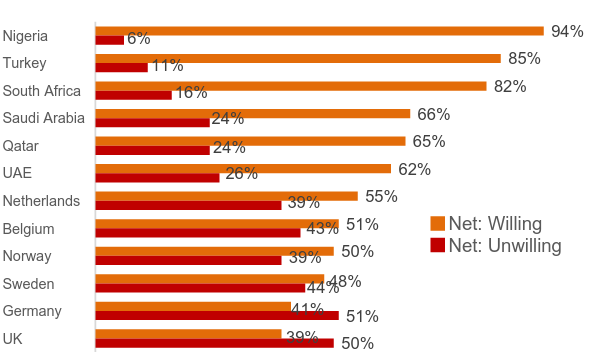- New research published by PwC looking at the use of AI and robotics in healthcare
- It reveals UK patients are the most sceptical in EMEA
- However, 55% of consumers across EMEA countries are willing to use AI and robots instead of human doctors
- Up to 73% of respondents would be happy for a robot to perform a minor surgical procedure
- Patients in developing markets are more open-minded about tech than those in Western Europe
- 17% of existing UK healthcare jobs are susceptible to automation from robotics and AI by the 2030s
UK patients are the most sceptical in Europe, the Middle East and Africa (EMEA) when it comes to having robotics and AI involved in their healthcare.
New research from PwC shows that just 39% of UK patients say they are willing to engage with artificial intelligence/robotics in healthcare, in sharp contrast with other countries in the EMEA region, such as Nigeria where 94% of patients are willing.
Even though UK patients are more sceptical, the fact that nearly 40% would be willing to engage with technology in their healthcare experience signals a huge opportunity to transform healthcare delivery for the benefit of patients.
In the UK, men are significantly more willing than women – 47% compared to 32% – to engage with AI and robots for healthcare.
And, perhaps unsurprisingly, the older generation are much more sceptical than the young – 33% compared to 55%.
Well over half of 18 to 24 year olds would be willing to engage with AI and robotics to take care of some of their health
PwC’s report, entitled What doctor? Why AI and robotics will define New Health, is based on a survey of over 11,000 people from 12 countries across Europe, the Middle East and Africa.
More than half of the respondents (55%) said they would be willing to use advanced computer technology or robots with AI that can answer health questions, perform tests, make a diagnosis, and recommend treatment.
This has the potential to transform healthcare delivery to make it better, faster and more accessible for all.
This report follows PwC’s recent Economic Outlook paper, published in March, which predicts that 17% of healthcare jobs in the UK are likely to be impacted by AI.
Brian Pomering, PwC healthcare partner, said of the findings: “While taken at face value it appears UK patients are most sceptical about the use of AI and robotics in healthcare, closer examination reveals a significant potential market.
“The younger the demographic group, the more likely they are to see new health technologies in a positive light.
“Well over half of 18 to 24 year olds would be willing to engage with AI and robotics to take care of some of their health.
“If only a proportion start to use more services delivered through technology, that could begin to make big savings. This could, in turn, make a serious contribution to addressing the huge financial challenges facing the health system in the UK.”
The survey found that even in the operating theatre, respondents would be willing for a robot to perform a minor surgical procedure instead of a doctor.

UK citizens remain concerned about the use of AI and robotics in healthcare
Respondents in Nigeria, Turkey and South Africa are the most willing to undergo minor surgery performed by robots (73%, 66% and 62% respectively), with the UK the least willing (36%).
Perhaps unsurprisingly, the situation changes dramatically when it comes to major surgery, such as replacement of a knee or hip joint, removal of a tumour, or heart surgery. Even so, a significant percentage of respondents are willing to undergo major surgery performed by a robot: ranging from 69% in Nigeria to 40% in the Netherlands and 27% in the UK.
The survey also explores the key drivers for a person’s willingness or unwillingness to use an AI-enabled or robotic health procedure or service.
Easier and quicker access to healthcare services (36%) and speed and accuracy of diagnoses (33%) are the primary motivators for willingness, with lack of trust in robots being able to make decisions (47%) and lack of the human touch (41%) as the primary reasons for their reluctance.




